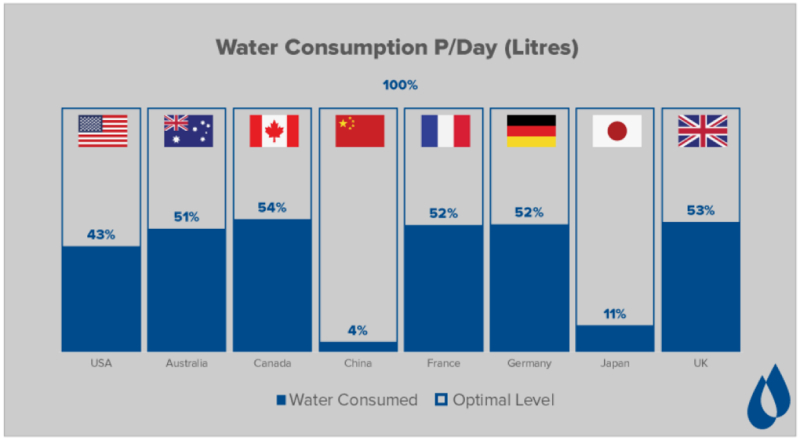
Humans are roughly 60% water on average, and if we don’t drink enough fluids to replenish the water lost through daily activities, it takes a toll on both body and mind.
Dehydration can lead to severe health issues if left unchecked, but even mild cases can impair physical performance and cognitive function.
In this article, we discuss what dehydration does to your body - and why staying hydrated is vital for keeping our bodies and minds functioning at their best.
What is dehydration?
Dehydration is defined as excessive loss of body water, with “excessive” starting around the 2% mark. However, even a 1% dip in body water can have a negative impact on our physical and mental abilities.
What causes dehydration?
It’s natural for humans to lose body water throughout the day as we breathe, sweat, and go to the toilet. Dehydration occurs when we don’t drink enough water to offset the water being used to carry out these bodily functions.
Various factors can speed this process up, making dehydration more likely. Hot weather, intense physical activity, lack of sleep, illness (especially with fever, vomiting, or diarrhoea), and certain medications can all increase fluid loss.
Additionally, consuming too much caffeine or alcohol, both of which have diuretic effects, can contribute to dehydration. Failing to replenish lost fluids, especially under these conditions, can quickly lead to dehydration and its associated symptoms.
What are the effects of dehydration?
In broad terms, dehydration clouds the mind and weakens the body. But there are actually several processes in motion when we fail to balance water intake with water loss.
The stages of dehydration
Dehydration progresses through stages, each with increasingly serious effects on the body and mind::
1. Thirst
Many don’t realise it, but thirst is the first sign of dehydration. Ideally, you should drink water before you feel thirsty. This is the only way to completely avoid dehydrating.
At this stage, you might notice a dry mouth, slight fatigue, and possibly a mild headache, but drinking water can quickly resolve these early symptoms.
2. Early physical & mental impairment
As dehydration deepens, a series of physiological and biochemical changes occur, leading to a range of symptoms:
- Muscle cramps: Dehydration causes an imbalance in electrolytes like sodium, potassium, and calcium, which are crucial for muscle function. When these electrolytes run dry, it disrupts the normal electrical signals that control muscle contractions, leading to muscle cramps.
- Fatigue: Dehydration reduces blood volume, which means less oxygen and fewer nutrients are delivered to cells, particularly muscle cells, resulting in fatigue.
- Difficulty concentrating: Dehydration can affect neurotransmitter function and slow down brain activity. This disruption impacts memory, attention, and overall cognitive performance, leading to difficulty concentrating and a general feeling of mental fog.
- Headaches and mood changes: Dehydration can lower blood pressure, decreasing blood flow to the brain. This can lead to headaches, feelings of irritability and mood changes.
3. Fainting
The reason we faint when dehydrated is that the heart struggles to pump enough blood to the brain and other vital organs, causing a temporary loss of consciousness.
4. Organ Damage
If dehydration continues unchecked, it can lead to serious organ damage.
The kidneys, which require sufficient water to filter waste from the blood, may begin to fail, leading to toxin build up in the body.
The brain and heart are also at risk, and electrolyte imbalances can cause muscle spasms, involuntary movements, or even seizures.
This stage of dehydration is extremely dangerous and requires immediate medical intervention.
5. Organ failure and death
In the most extreme cases, if dehydration is not treated, it can be fatal.
The continued loss of fluids and electrolytes can lead to multiple organ failure, leaving the body unable to perform essential functions.
Death due to dehydration is a tragic outcome that highlights the importance of maintaining proper hydration.
How longstanding dehydration affects the body
Regularly drinking some, but not enough, water can help prevent some of the more serious symptoms discussed above, such as organ failure. However, when sustained, minor hydration can also lead to a range of body issues:
- Dry skin and dull complexion: Water is essential for maintaining healthy, glowing skin. Without adequate hydration, your skin can become dry, flaky, and more prone to irritation.
- Loss of skin elasticity: Healthy skin is firm and flexible, and this is largely due to its water content. This is why long-standing dehydration can make your skin appear saggy, more prone to wrinkles, and slower to bounce back when pinched or stretched.
- Digestive issues: Water helps to keep bowel movements regular. If dehydration becomes, chronic over time, it can lead to constipation and digestive discomfort. It can also contribute to acid reflux, as a lack of fluids can hinder the production of essential digestive enzymes.
- Bad breath: Saliva has antibacterial properties that help keep your mouth clean. When you're dehydrated, saliva production decreases, which can lead to dry mouth and bad breath. This can also increase the risk of cavities and gum disease.
- Joint pain: Your joints rely on water to stay lubricated and function smoothly. Frequent dehydration reduces the fluid between joints, leading to pain and stiffness.
- Dry eyes: When you're dehydrated, your body produces fewer tears, which can lead to dry, irritated, and red eyes. This can lead to blurred vision, an increased sensitivity to light, and higher chances of infection.
Is dehydration a problem in the UK?
According to Water Logic, on average, people in the UK drink just over 50% of the recommended water intake per day.

The average for UK students, specifically, is even lower, with studies suggesting that children only drink around a quarter of the volume they need to during the school day.
Further studies have revealed that losing as little as 1% body water can reduce productivity rates by 15%, a figure that more than doubles between 3 and 4% body water loss.
This means that a large proportion of the population is underperforming, either at work, in school, or in other important aspects of life.
What’s the best way to improve hydration?
If you own a business or are in charge of school facilities, there are several ways to encourage healthy hydration habits among staff and students. But far and away the most essential is providing easy access to water throughout the work or school day.
Installing hydration systems such as water coolers, drinking fountains, bottle fillers, and - where appropriate - water boilers in easy-access locations ensures everyone has the means to properly hydrate and perform at the best of their abilities.
For businesses, this means:
-
Enhanced productivity: Well-hydrated employees are more focused, alert, and able to concentrate on their tasks. This leads to increased efficiency and higher quality work.
-
Reduced absenteeism: Workplace water dispensers help prevent fatigue and health issues that can lead to absenteeism.
-
Improved employee morale: Providing convenient access to water shows that the company values employee well-being. This can lead to higher job satisfaction and a more positive workplace environment.
-
Fewer mistakes: Hydrated employees can think clearly and quickly, leading to fewer instances of human error in the workplace.
For schools, this means:
-
Better academic performance: Students who are well-hydrated are more likely to concentrate and retain information, leading to improved academic performance and test scores.
-
Increased energy levels: Proper hydration helps maintain students' energy levels throughout the day, reducing feelings of fatigue and allowing for more active participation in class and extracurricular activities.
-
Enhanced behaviour and mood: Hydrated students are less likely to experience mood swings or irritability, contributing to a more positive classroom atmosphere and better interactions with peers and teachers.
-
Fewer health issues: Access to water helps prevent dehydration-related health problems, such as headaches and dizziness, which can lead to fewer visits to the nurse and fewer sick days. It can also help to lower obesity rates.
Hydrate with Cactus Water Systems
Proper hydration is key to health and well-being in all walks of life. To ensure you, your team, or your students stay hydrated and perform at their very best, contact Cactus Water Systems today for expert support.












